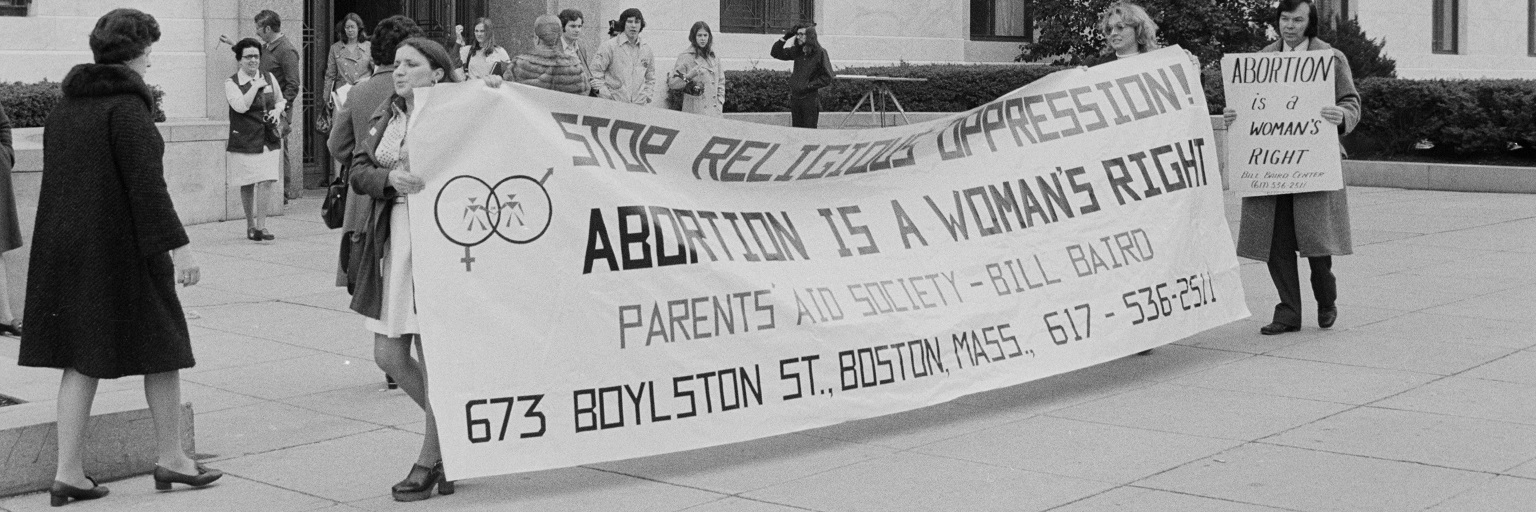Comstock Act of 1873 & State Regulation
Over the course of the 19th century, individual states began to restrict and criminalize access to abortions, birth control, and the distribution of “obscene” or “indecent” information or materials. These laws fell under a state’s “police power” to promote and protect the health, safety, and welfare. In 1873, Congress passed an “Act for the Suppression of Trade in, and Circulation of, Obscene Literature and Articles of Immoral Use.” It was referred to as the “Comstock Act,” after Anthony Comstock, leader of the New York Society for the Suppression of Vice, who pushed Congress to pass this law. The Act criminalized sending through the U.S. Postal Service anything deemed “obscene, lewd, or lascivious” or any information about or device used for the purposes of abortion or contraception. States passed “little Comstock” laws to criminalize birth control and abortion, as well as information or material about sex, birth control, and abortion. When Margaret Sanger opened the first birth control clinic in 1916 in New York, she was arrested and convicted of “obscenity” and exhibiting or offering to sell “indecent” articles under New York’s “little Comstock” law.
Supreme Court & State Regulation
Just as states criminalized abortion and birth control, states also began to decriminalize abortion and birth control. For instance, in 1970, New York passed a law that legalized abortion up to the 24th week of pregnancy. The federal courts also began to protect access to birth control and abortion through interpretations of the law and declaring restrictions unconstitutional. In United States v. One Package of Japanese Pessaries (1936), the U.S. Court of Appeals for the Second Circuit in New York held that physicians could distribute contraception to patients for medical purposes and their well being. In Griswold v. Connecticut (1965), the Supreme Court struck down Connecticut’s “little Comstock” law restricting contraception as applied to married couples, and, in Eisenstadt v. Baird (1972), the Court extended its decision in Griswold to unmarried individuals seeking contraception. In Roe v. Wade (1973), the Supreme Court decriminalized obtaining an abortion prior to viability, and in Dobbs v. Jackson Women’s Health Organization (2022), the Supreme Court overturned its decision in Roe leaving it up to the states whether to criminalize or protect access to abortion.
Griswold v. Connecticut (1965)
The Supreme Court struck down restrictions on distribution of contraception and counseling on the use of contraception to married couples as a violation of the fundamental right to privacy under the Constitution. The Court located the right to privacy in the penumbras of the Bill of Rights, including in the First, Third, Fourth, and Ninth Amendments. Other Justices located the right to privacy in the 14th Amendment’s Due Process Clause. Learn More
Roe v. Wade (1973)
The Supreme Court struck down a state law criminalizing abortion. The Court held that the right to choose to obtain an abortion is part of the fundamental right to privacy protected by the Due Process Clause under the 14th Amendment of the Constitution. While the state has a legitimate interest in protecting the health of the pregnant person and potential human life, this interest is balanced by the right to choose. During the first trimester of pregnancy, the decision to abort is between the pregnant person and doctor and the state may not regulate it; in the second trimester, the state may impose regulations on abortion reasonably related to the health of the pregnant person; and in the third trimester, once the fetus is “viable,” the state may restrict or ban abortion unless when necessary to save the life of the pregnant person. Learn More
Dobbs v. Jackson Women’s Health Organization (2022)
The Supreme Court overruled Roe v. Wade and held that states could ban abortion prior to viability, and that the Constitution does not support a right to obtain an abortion as part of a fundamental right to privacy under the Due Process Clause of the 14th Amendment. Learn More
- Maria T. Vullo, “People v. Sanger and the Birth of Family Planning Clinics in America,” Judicial Notice: A Periodical of New York Court History, issue 9 (2013), posted by the Historical Society of the New York Courts
- Mary Ziegler, Abortion and the Law in America: Roe v. Wade to the Present (2020)
- Mary Ziegler, Reproduction and the Constitution in the United States (2022)
- Resources & Research, posted by the Center for Reproductive Rights
“How overturning Roe will adversely affect historically marginalized women,” by Leo Kamin and Evelyn Chi, includes videos and discussion questions, posted on PBS Thirteen

